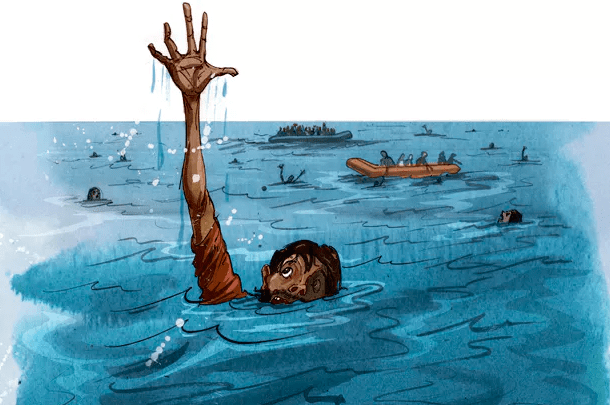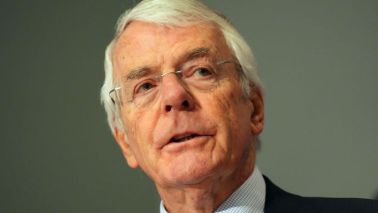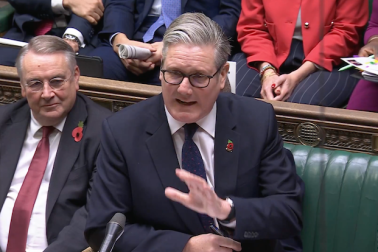When a humanitarian tragedy disappears from our newspapers, there are two possibilities: that the crisis is over and life for survivors is gradually returning to normal — or that the human toll has become so routine as to no longer be considered newsworthy. Sadly, the deaths of migrants from North Africa and the Middle East as they attempt to cross the Mediterranean to seek a new life in Europe fall into the latter category. Eighteen months after the photographs of little Alan Kurdi’s body on a Turkish beach generated a huge swell of public emotion, entire families are still dying on a regular basis. In the first ten weeks of this year, some 525 people were lost crossing the Mediterranean.
Europe is still no closer to ending this outrage. As a continent we have wavered between trying to stem the tide of boats and encouraging it — as Angela Merkel fatally did by briefly opening Germany’s doors to migrants in the weeks following Alan’s death. Policy tends to be driven by public emotion: torn between compassion for people thought to be in a desperate situation and fears that we are taking in too many of the wrong sort of people, with grave implications for national security.
It is ludicrous to regard migrants who survive their journey across the Mediterranean and land on European shores as saboteurs, out to destroy our way of life. But it’s also wrong to see them as the world’s poorest and most desperate people. Some may have begun their journey escaping wars in Syria, Somalia or elsewhere, but by the time they board their boats on the southern Mediterranean coast, most have already arrived in safe countries. The Mediterranean leg of their journey is a search for a better life. What they are escaping from is a life in a refugee camp in favour of a far riskier, yet potentially far more rewarding, life of opportunity.
Europe has failed to find a coherent way of addressing the migration problem because its approach is stuck in the 1940s. International law on asylum is still based on a firm distinction between refugees and economic migrants which in practice does not exist: many migrants are a mixture of both. Poverty, combined with lack of opportunity for self-betterment, creates its own form of desperation.
The recent fuss over the Dubs Amendment encapsulates what is wrong with our current debate. This was a proposal from Lord Dubs, a Labour peer who arrived in Britain as a child seeking refuge from the Nazis, that Britain takes in about 3,000 child refugees from Europe. It was inevitable that parallels should be drawn with his proposal and Kindertransport — but the situation has changed, utterly, from that we once faced. We are — or were, until the government announced the end of the arrangement — playing into the hands of people traffickers who are happy to take money from migrants to put them in unseaworthy boats and care not one jot for their lives.
Instead of the Dubs Amendment, the government proposed something better: taking 20,000 children straight from the Middle East and giving them refugee status in Britain. This fulfils our humanitarian obligation while cutting out the people-traffickers. David Cameron lost this argument in the Commons so gave up and started a Dubs scheme; Theresa May abandoned it. She was promptly accused of heartlessness in turning away child refugees, but said nothing in response. She might have mentioned that accommodating refugees in Britain can cost 50 times as much as doing so in Jordan, where Britain is doing a great deal. Indeed, her government is spending more to help Syrian refugees than any country in Europe.
But it must not stop there. As Oxford’s Professor Paul Collier argues in these pages, fixing up people with food and tents is not enough. The vast majority do not want to live in camps and will not thrive in them. Far better if refugees could be resettled temporarily in countries close to Syria from which they are much more likely to return, and in conditions which offer them much greater opportunities to support themselves and develop their skills than does a refugee camp. Professor Collier’s ideas are taken seriously by Mrs May’s government, which now supports companies in Jordan that employee Syrian refugees. No other nation — in Europe or beyond — is doing more in this field.
The government could boast about this. But instead it stays quiet, as if ashamed of defying the prevailing orthodoxy. Her enemies are not so reticent. Nicola Sturgeon has been busy using the closure of the Dubs scheme as proof of the blackness of Westminster hearts.
Ministers need to stop being caught on the defensive and continue the development of a policy aimed at helping the maximum number of Middle Eastern refugees while minimising the evil human trade that is causing so many deaths in the Mediterranean. Global migration is perhaps the greatest new problem of our times, and Britain is leading the world in its response. The Prime Minister should have the courage to say so.






Comments